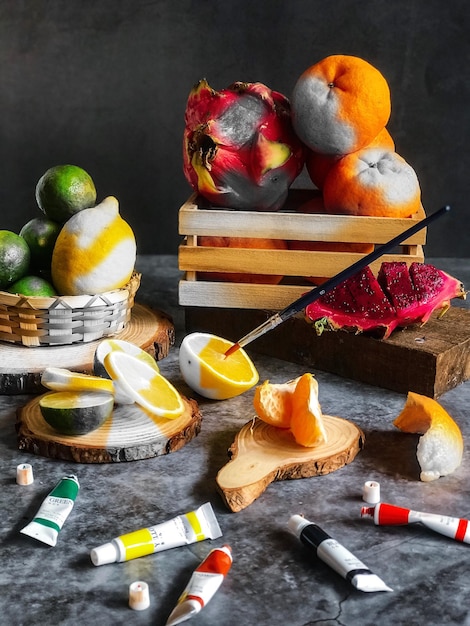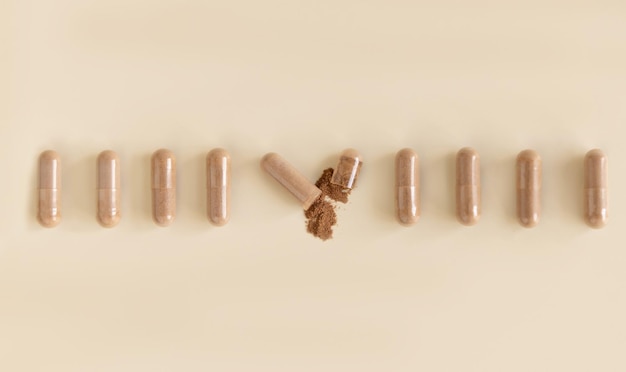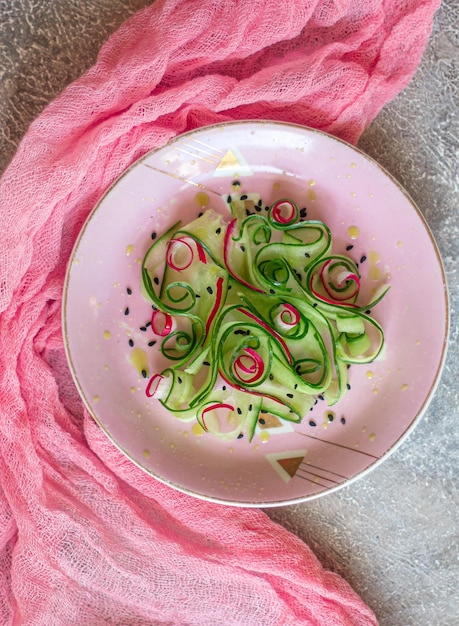Gut Health: The Science Behind Probiotics and Prebiotics

Gut health is increasingly recognized for its crucial role in overall well-being, with probiotics and prebiotics becoming popular tools for maintaining a balanced gut microbiome and supporting various health benefits.
The buzz around gut health goes mainstream: Understanding the science behind probiotics and prebiotics isn’t just a fleeting trend; it’s a reflection of growing awareness about the gut’s profound impact on our overall well-being. But what exactly are probiotics and prebiotics, and how can they contribute to a healthier you?
Understanding the Gut Microbiome
The gut microbiome is a complex and dynamic ecosystem within your digestive tract, composed of trillions of microorganisms, including bacteria, fungi, viruses, and other microbes. This diverse community plays a vital role in various aspects of health.
The Importance of Microbial Diversity
A healthy gut microbiome is characterized by a high level of diversity. This means a wide variety of different microbial species living in harmony. Diversity contributes to the resilience and stability of the gut ecosystem.
Factors Influencing the Gut Microbiome
Many factors influence the composition and function of the gut microbiome, including diet, lifestyle, genetics, and medication use. Diet is a particularly powerful modulator, as the foods we consume directly feed the microbes in our gut.
- Diet: A diet rich in fiber, fruits, and vegetables supports a diverse and balanced gut microbiome.
- Antibiotics: Antibiotics can disrupt the gut microbiome by killing both beneficial and harmful bacteria.
- Stress: Chronic stress can negatively impact the gut microbiome, leading to imbalances.
Maintaining a healthy and diverse gut microbiome is essential for optimal health and well-being. Focusing on dietary and lifestyle strategies can promote a thriving gut ecosystem.
Probiotics: The Beneficial Bacteria
Probiotics are live microorganisms that, when administered in adequate amounts, confer a health benefit on the host. They are often referred to as “good” or “beneficial” bacteria. Probiotics can be consumed through fermented foods or dietary supplements.
How Probiotics Work
Probiotics exert their beneficial effects through various mechanisms, including competing with harmful bacteria for resources, producing antimicrobial substances, and modulating the immune system.
Sources of Probiotics
Probiotics are available in a variety of forms, including fermented foods, such as yogurt, kefir, sauerkraut, and kimchi, as well as dietary supplements in capsule, tablet, or powder form.

Choosing the Right Probiotic
Selecting the right probiotic supplement can be challenging, as different strains have different effects. It’s important to consider the specific health condition you’re targeting, as well as the quality and potency of the product.
- Strain Specificity: Different probiotic strains have different effects on the body.
- CFU Count: CFU (Colony Forming Units) indicates the number of live bacteria per serving.
- Quality and Purity: Choose products from reputable brands that undergo third-party testing.
Probiotics can be a valuable tool for supporting gut health, but it’s essential to choose the right product and use it appropriately. Consulting with a healthcare professional can help you determine the best probiotic for your individual needs.
Prebiotics: Fueling the Good Bacteria
Prebiotics are non-digestible food ingredients that promote the growth and activity of beneficial bacteria in the gut. Unlike probiotics, which are live microorganisms, prebiotics serve as food for the existing bacteria in your gut. They are essentially fuel for the good bacteria.
Types of Prebiotics
Several types of prebiotics exist, with the most common being oligosaccharides, such as fructans and galactans. These are found naturally in various plant-based foods.
Sources of Prebiotics
Prebiotics are abundant in many fruits, vegetables, and whole grains. Some of the best sources include onions, garlic, leeks, asparagus, bananas, oats, and barley.

Benefits of Prebiotics
By selectively promoting the growth of beneficial bacteria, prebiotics can contribute to a healthier gut microbiome, improving digestion, boosting immunity, and even influencing mood.
Incorporating prebiotic-rich foods into your diet is a simple and effective way to support a thriving gut ecosystem. This provides the necessary fuel for beneficial bacteria to flourish, promoting overall well-being.
The Gut-Brain Connection
The gut-brain connection is a bidirectional communication pathway between the gut and the brain. This intricate network involves the nervous system, the endocrine system, and the immune system.
How the Gut Affects the Brain
The gut microbiome can influence brain function through several mechanisms, including the production of neurotransmitters, such as serotonin and dopamine, which play a crucial role in mood regulation.
How the Brain Affects the Gut
Conversely, the brain can also influence gut function, as stress, anxiety, and depression can alter gut motility, increase inflammation, and disrupt the gut microbiome.
The gut-brain connection highlights the importance of maintaining a healthy gut for optimal mental and emotional well-being. Addressing gut health concerns can positively impact brain function and mood.
The Role of Diet
Diet plays a crucial role in shaping the composition and function of the gut microbiome. A diet rich in fiber, fruits, vegetables, and fermented foods provides the necessary nutrients to support a diverse and balanced gut ecosystem.
Foods to Promote Gut Health
Certain foods are particularly beneficial for promoting gut health, including:
- Fiber-rich foods: Fruits, vegetables, whole grains, and legumes provide fuel for beneficial bacteria.
- Fermented foods: Yogurt, kefir, sauerkraut, and kimchi contain live probiotics.
- Polyphenol-rich foods: Berries, dark chocolate, and green tea are rich in polyphenols, which have prebiotic effects.
Foods to Avoid
Conversely, certain foods can negatively impact the gut microbiome. These include:
- Processed foods: High in sugar, unhealthy fats, and artificial additives, which can disrupt the gut microbiome.
- Refined carbohydrates: White bread, pasta, and pastries can promote the growth of harmful bacteria.
- Artificial sweeteners: Some artificial sweeteners can alter the composition and function of the gut microbiome.
Adopting a gut-friendly diet is a powerful strategy for optimizing gut health and promoting overall well-being. Making conscious food choices can significantly impact the health and diversity of your gut microbiome.
Practical Strategies for Improving Gut Health
Improving gut health involves a multifaceted approach that encompasses dietary and lifestyle modifications. Here are some practical strategies to consider:
Increase Fiber Intake
Gradually increase your intake of fiber-rich foods, aiming for at least 25-30 grams per day. This provides fuel for beneficial bacteria.
Incorporate Fermented Foods
Regularly consume fermented foods, such as yogurt, kefir, sauerkraut, and kimchi. These foods contain live probiotics that can help replenish and diversify your gut microbiome.
Manage Stress
Practice stress-reducing techniques, such as meditation, yoga, or deep breathing exercises. Chronic stress can negatively impact the gut microbiome
Consider Probiotic Supplements
If you’re struggling to get enough probiotics through diet alone, consider taking a high-quality probiotic supplement. Choose a product with a diverse range of strains and a high CFU count.
Limit Antibiotic Use
Use antibiotics only when necessary and under the guidance of a healthcare professional. Antibiotics can disrupt the gut microbiome and lead to imbalances.
By incorporating these strategies into your daily routine, you can take proactive steps to improve your gut health and promote overall well-being. This can lead to long-term health benefits.
| Key Point | Brief Description |
|---|---|
| 🌱 Gut Microbiome | Complex ecosystem of microorganisms in your digestive tract. |
| 💪 Probiotics | Beneficial live bacteria that can improve gut health. |
| 🍎 Prebiotics | Non-digestible foods that feed beneficial gut bacteria. |
| 🧠 Gut-Brain Axis | Communication network between the gut and the brain. |
Frequently Asked Questions
▼
Probiotics can improve digestion, boost immunity, reduce inflammation, and enhance nutrient absorption by balancing gut bacteria.
▼
Prebiotics nourish the good bacteria in your gut, encouraging their growth and activity, leading to a healthier and balanced gut microbiome.
▼
Yogurt, kefir, sauerkraut, kimchi, and kombucha are naturally rich in probiotics due to the fermentation process, which cultivates beneficial bacteria.
▼
Yes, the gut and brain are connected through the gut-brain axis. An unhealthy gut can impact neurotransmitter production, potentially influencing mood and mental health.
▼
Some individuals may experience mild digestive symptoms like bloating or gas when starting probiotics, but these usually subside as the body adjusts to the new bacteria.
Conclusion
As gut health goes mainstream: Understanding the science behind probiotics and prebiotics empowers individuals to take control of their well-being. By prioritizing a balanced gut microbiome through dietary and lifestyle choices, we can unlock a myriad of health benefits, paving the way for a healthier and happier life.
